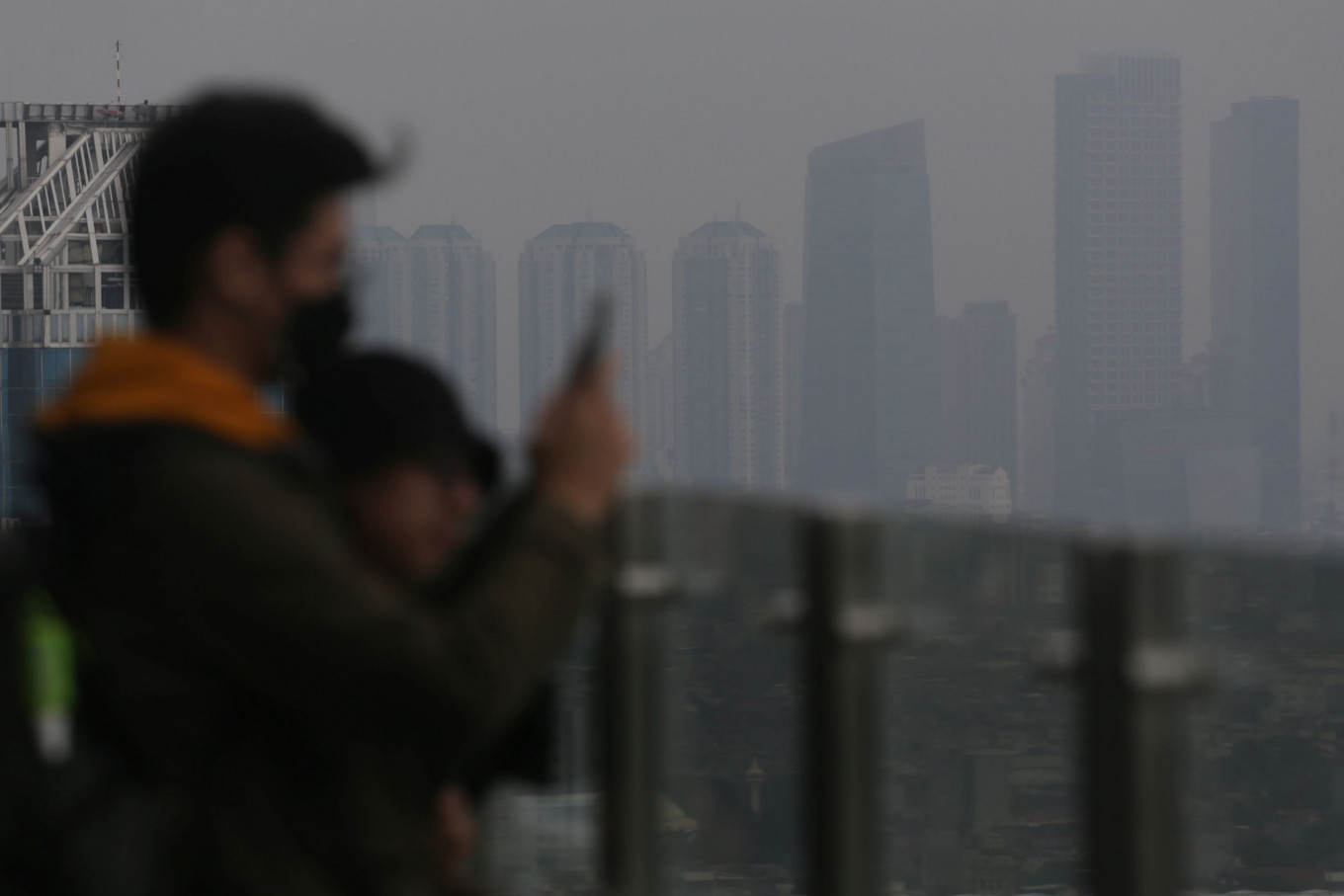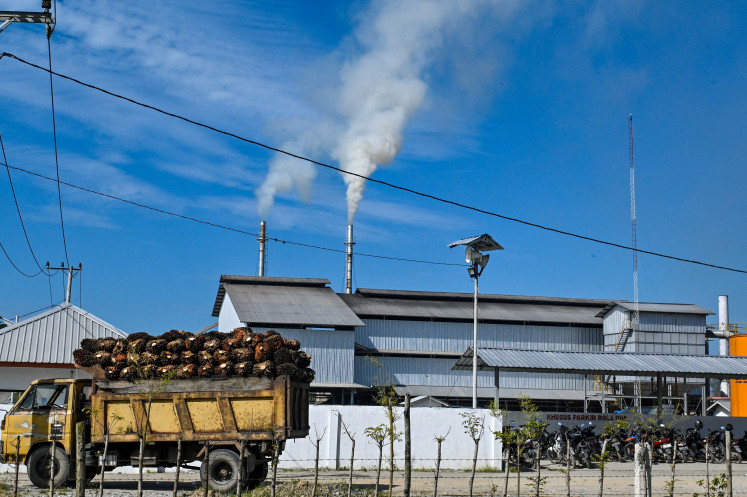Popular Reads
Top Results
Can't find what you're looking for?
View all search resultsPopular Reads
Top Results
Can't find what you're looking for?
View all search resultsBreathless: Workers pessimistic over plans to curb Jakarta air pollution
Jakartans are suffering from the worsening air pollution in the capital, which has routinely reached an unhealthy level since May and was labeled as the most polluted major city in the world by Swiss air quality firm IQAir earlier this month.
Change text size
Gift Premium Articles
to Anyone
H
oping to get some fresh air on a Sunday morning, 49-year-old Primatmojo “Pri” Djanoe hit the streets of downtown Sudirman in Central Jakarta for a long walk during a weekly car-free day in late July.
But after he returned home, fever and endless coughing took hold for days.
“I got an acute respiratory infection [ARI],” Pri, a communications consultant, said to The Jakarta Post on Aug. 17.
Pri is just one of many Jakartans suffering from the worsening air pollution in the capital, which has routinely reached an unhealthy level since May and was labeled as the most polluted major city in the world by Swiss air quality firm IQAir earlier this month.
Authorities have blamed the intense dry season this year for exacerbating the dismal state of air quality in the capital, which is heavily polluted by vehicles and industrial activities.
Re-masking
Many people, like 24-year-old media company employee Ryaska Medrina, are now once again wearing masks to protect themselves from the risks of inhaling pollutants.
“It’s because I’ve been seeing a lot of my office colleagues getting sick lately,” Ryaska told the Post.
Pri started wearing his mask outdoors, rather than indoors, as was mandated and recommended during periods of high COVID-19 prevalence.
As the pollution extends to the Greater Jakarta area, 42-year-old senior designer Adhitya Pattisahusiwa, who resides in Bumi Serpong Damai, South Tangerang, gets sick when he does not wear a mask.
“I once forgot to put on the mask, and when I got home my nose and respiratory tract were very itchy,” Adhitya said.
To try to improve his health, Adhitya started riding his bike to the office every day, taking a 45-minute route from his house to Karawaci regency in Tangerang. But his recent exposure to the outdoor air has concerned him.
“I started having second thoughts, too. Would I get pneumonia if I keep biking through this horrible air?” Adhitya added.
Unconvincing plans
In response to the worsening air pollution, the government has discussed several solutions to tackle the problem, from carrying out emissions testing on motorized vehicles to encouraging more remote working, integrating more electric buses and planning a 4-in-1 policy implementation for cars. It will also form a special task force to handle the problem.
However, many are pessimistic that these solutions will be able to solve the long-term problem.
“The 4-in-1 rule honestly sounds dumb. It would only encourage people to become joki (passengers-for-hire). Nobody wants to have strangers in their cars,” said 23-year-old Fadhil, a research executive at a market research agency in Tebet, South Jakarta.
When he’s not working from home, Fadhil drives from his home in Cibubur, East Jakarta, to his office in Tebet because public transport to and from the Cibubur area is still lacking.
Adhitya also felt that mass transit in the entire South Tangerang municipality “is not yet reliable”, with bus stops too far apart and limited routes.
Ryaska, who also resides in the municipality, shared the same sentiment.
“I wish there were other public transport routes to Bumi Serpong Damai, aside from the commuter line train, it gets insanely crowded during rush hours,” she said, noting the lack of options available to commuters.
“Because in the end, if you take the MRT, it will only get to Lebak Bulus station, and eventually you have to get into a car again from that point,” Ryaska said, adding that the roads from Bumi Serpong Damai to Jakarta have been extremely congested in the last couple of years.
Energy and sustainability expert Dicky Edwin Hindarto thought that people’s low expectations for these solutions were fitting because much of what the government has outlined will not be effective.
“It’s all a big joke. This is a very reactionary response to an ages-old problem that should always have been a focus,” Dicky told to the Post on Aug. 18.
Dicky explained that above all, the government needs to make sure that mass transit is reliable for people in all parts of the country, not just in Jakarta, since residents of the Greater Jakarta area come to the city by car.
Jakarta has over 24.5 million vehicles traveling its roads and millions more commuting from nearby satellite cities every day. Every year, the capital gets an additional million vehicles.
Transitioning from motorized to electric vehicles (EVs) is also a temporary solution, he said, given that EVs are still powered by the coal-fired power plants that are abundant in the Jakarta area and have been largely blamed by environmentalists for the spike in air pollution.
“So, if we start using electric cars and buses, it may reduce the emissions on the streets, but not from the power plants surrounding Jakarta,” Dicky said.
Dicky thinks that requiring people to work from home would surely reduce the pollution at first, but the rising electricity use in households would give rise to an increase in pollution from the coal-powered plants.
“The solution needs to be structured and well-planned, from public transport to the industry sector,” Dicky said.










